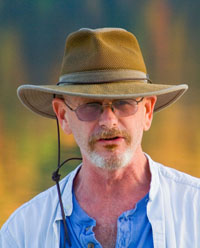Bulletin News

10/02/2013
The subject of hydrofracking for natural gas energy has become a highly charged issue in America, with everyone, seemingly, taking sides. That hasn’t stopped author Seamus McGraw, whose byline has appeared in many national magazines, from jumping right into the political fray.
The author of The End of Country, McGraw will bring his own insights based on his up-close-and-personal experience with the mining technique impact on his hometown in a SUNY Cortland lecture on Monday, Oct. 14.
McGraw’s presentation, “Finding Your Footing in a Fractured Land: The Moral and Philosophical Dilemma of Fracking,” begins at 7 p.m. in the Sperry Center Johnson Lecture Hall, Room 106.
The talk, which is free and open to the public, is sponsored by the College’s Philosophy Department, the Center for Ethics, Peace and Social Justice, and the Environmental Justice Committee of the Center for Gender and Intercultural Studies.
“There are few places where the divisions are quite as visible as New York state at the moment,” McGraw said. “When this started in Pennsylvania, you didn’t have the ossified, partisan lines there. The opposition hadn’t hardened on both sides. We were caught quite unaware. In New York, quite frankly, this had already been hijacked by — let’s just call them ‘ardent voices’ — on both sides. That’s what’s significantly different.”
McGraw is a full-time writer who has seen his work published in Playboy, Reader’s Digest, Radar, Spin and The Forward. He received the Freedom of Information Award from the Associated Press Managing Editors as well as honors from the Casey Foundation and the Society of Professional Journalists.
His 2011 book received major reviews, including one by the American radio host, activist and attorney specializing in environmental law, Robert F. Kennedy, Jr.
“Deeply personal, sometimes moving, sometimes funny, The End of Country lays out the promises and the perils faced not just by the people of one small Pennsylvania town but by our whole nation,” Kennedy wrote.
“This cautionary tale should be required reading for all those tempted by the calling cards of easy money and precarious peace of mind,” Tom Brokaw wrote. “The result too often is bitter feuds, broken dreams, a shattered landscape.”
McGraw views energy mining in upstate New York state and elsewhere around the country as probably inevitable.
 |
| Seamus McGraw |
“I’m a guy who used to drive around in a waste vegetable oil-powered Mercedes,” McGraw said. “For us to achieve what we all most fervently wish for — an independent, renewable energy supply — we require an infrastructure,” he said. “And in order to do that, we require some dependence on fossil fuel until we can turn around and shake it off.
“The question is, ‘What fossil fuel are we going to use?’ And the question is, ‘Are we going to police it or are we going to stand behind our ideological barricades and wave our dogma at each other?’”
Some of the greenest current solutions leave their own carbon footprint, McGraw said. He’s aware of one proposed massive California solar array project that will power 450,000 houses, for example.
“All the stuff that’s going to be used in construction of that development has to be mined, has to be manufactured, has to be shipped, has to be erected on site,” McGraw said. “That carries a fossil footprint. And the installation they are putting in has about a 30-year lifespan, which means we have to repeat this all over again in 30 years. That’s just for those 450,000 homes. There are 350 million people in America.”
SUNY Cortland Professor of Philosophy Kathryn Russell invited McGraw to speak on campus and is teaching from his book in two of her classes this semester, Environmental Ethics and Science and Its Social Context.
“The topic of ‘fracking’ in the context of climate disruption is certainly a timely one,” Russell said. “I hope McGraw’s lecture will help the issue come alive for students at SUNY Cortland. It will also give them a chance to dialogue with him.”
McGraw grew up in Susquehanna County, Pennsylvania, in the rocky, remote northeastern corner of the state, which is home to a community of stoic, low-income dairy farmers, many of them third- and fourth-generation, and more recent homesteaders seeking a haven from suburban sprawl.
He once pitched hay and spread manure on the same fields the gas companies are now prospecting, and he still lives in the woods of northeastern Pennsylvania with his wife and four children.
A battle for control has continued there since the discovery of one of the richest natural gas deposits the world has ever known, the Marcellus shale. The conflict pits the forces of corporate America against a band of locals determined to extract their fair share of the windfall, but not at the cost of their values or their way of life.
When McGraw’s own widowed mother was approached about leasing the family farm for gas exploration, he began to chronicle the experiences of his mother and her neighbors.
“When (our family) negotiated to lease, we were able to negotiate from a position of being better informed by virtue of when we did it and by observing what our neighbors had gone through,” McGraw said.
“When I do these talks, I very often raise the point. I’ll ask the people ‘what is fracking?’ There has been enough background noise for most and rudimentary information for some that people can give me a basic description. I always say, ‘That’s almost right, but you’re not cracking the rock, you’re exploiting existing fractures in the rock.’
“I argue that what’s taking place more than a mile below the surface is mirrored by what is taking place on the surface. You have these worried, divided communities that are, quite frankly, being exploited by people on both sides of the issue, which often has very little to do with the actual challenge at hand.
“The question is: do we have the character to get beyond that fractious debate — the polemics — and look at this with an unjaundiced eye,” McGraw queried. “I’m not sure that we do. But if we can do this, we are going to start doing this in places like SUNY Cortland.”
He is currently working on a documentary trailer about his family's experiences with the Marcellus shale.
For more information about McGraw’s book, visit his website. For more information about the talk, contact Russell at 607-753-2014.

